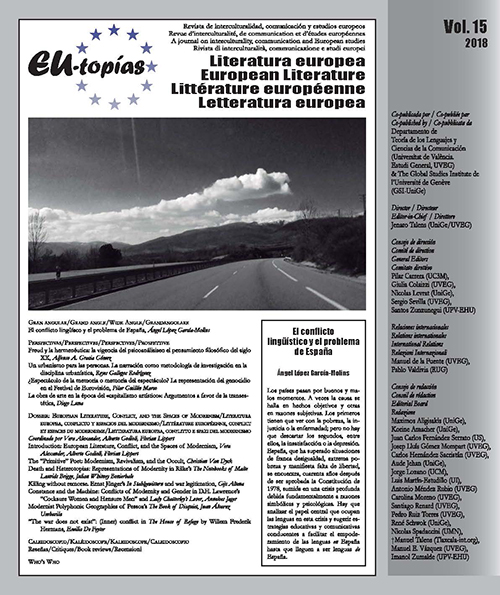The “Primitive” Poet: Modernism, Revivalism, and the Occult
DOI:
https://doi.org/10.7203/eutopias.0.18577Keywords:
Modernism, revivalism, occultism, Synge, Yeats, Eliot, Pound Abstract
Abstract
Focusing on the Occult and Revivalist movements as organic precursors to Modernism, this essay problematizes the traditional view that Modernism “belonged to 20th century pragmatism” (Surette, 1993, Preface, ix). Instead of a radical break from tradition, Modernism in fact drew from a well of mythic and anthropological referents in an attempt to reclaim and refashion culture. At a time when the science of anthropology was changing, “primitivity” itself was becoming increasingly privileged as a cultural inoculation against the workaday industrial mentality that Revivalists, Occultists, and later Modernists saw anathema to poetic production. In their privileging of “primitive” space and mythic subconsciousness, Revivalism and Occultism served as models to later Modernists in their quest for authentic sources of artistic inspiration.
 Downloads
Downloads
 References
References
Alexander, Neal & Moran, James (ed.) (2013), “Intro- duction: Regional Modernisms”, Regional Modernisms, Edinburgh: Edinburgh University Press, pp. 1–21.
Castle, George (2001), Modernism and the Celtic Revival, New York: Cambridge University Press.
Cullingford, Elizabeth (1981), Yeats, Ireland and Fascism, London: Macmillan
Eliot,ThomasStearns(1939),The Use of Poetry and The Use of Criticism, London: Faber and Faber.
Eliot, Thomas Stearns (1967), Selected Poems, New York: Houghton-Mifflin.
Eventz-Wentz, Walter (1911), The Fairy Faith in Celtic Countries, Oxford: Oxford University Press.
Lansdown, Richard (ed.) (2006), Strangers in the South Seas: The Idea of the Pacific in Western Thought, Honolu- lu: University of Hawai’i Press.
Logenbach, James (1990), Stone Cottage: Pound, Yeats and Modernism, New York: Oxford University Press.
Lonergan, Patrick(2013),“J.M.Synge,Authenticity, and the Regional.” Neal Alexander and James Moran (ed.), Regional Modernisms, Edinburgh: Edinburgh University Press, pp. 65-82.
Rulo, Kevin (2015), “Modernism and the antimodern in the ‘men of 1914’”, Neohelicon, 43, pp. 241-278. surette, Leon (1993), The Birth of Modernism: Ezra Pound, T.S Eliot, W.B Yeats, and the Occult, Montreal: McGill-Queens University Press.
Synge, John Millington (1972), The Aran Islands, Oxford: Oxford University Press.
Yeats, William Butler (1954), The Letters of W.B Yeats, edited by Alan Wade, London: Butler and Tanner.
— (1994), The Collected Works of W.B Yeats. Volume V: Later Essays, New York: Scribner.
— (1922), Plays in Prose and Verse, London: Macmillan and Co.
— (2008), The Collected Works of W.B. Yeats. Volume XIII: A Vision, New York: Scribner.
Downloads
Published
How to Cite
-
Abstract233
-
PDF (Español)65
Issue
Section
License
![]()
The authors conserve the copyright. All content published in EU-topías. Journal of interculturality, Communication, and European Studies are subject to the license Creative Commons Attribution-NonCommercial-ShareAlike 4.0 license. The full text of the license can be found at <http://creativecommons.org/licenses/by-nc-sa/4.0>
They may be copied, used, disseminated, transmitted and publicly displayed, provided that:
- The authorship and original source of the publication is cited (journal, publisher and URL of the work).
- They are not used for commercial purposes.
- The existence and specifications of this license of use are mentioned.
It is the responsibility of the authors to obtain the necessary permissions for images that are subject to copyright.



